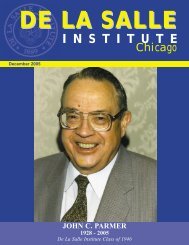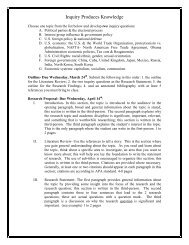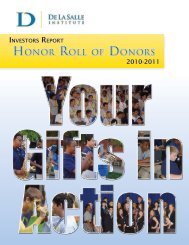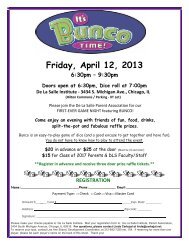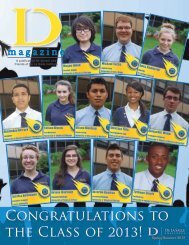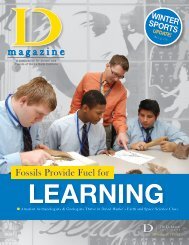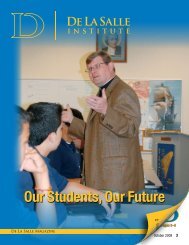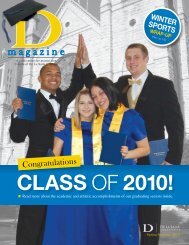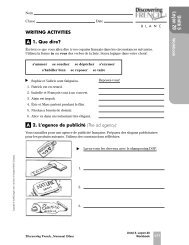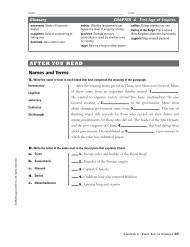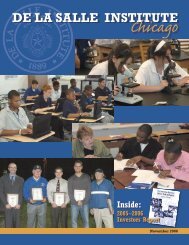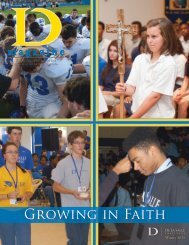You also want an ePaper? Increase the reach of your titles
YUMPU automatically turns print PDFs into web optimized ePapers that Google loves.
Academics<br />
Addition to Curriculum<br />
Mandarin Chinese Offered at <strong>De</strong> <strong>La</strong> <strong>Salle</strong><br />
Mandarin Chinese Added to DLS Curriculum<br />
“During the first class this semester, I asked students why they decided<br />
to take the Mandarin class,” Liang said. “They gave a variety of<br />
reasons, including a love of Chinese food! No matter what the reason,<br />
they have a lot of courage for doing so. Believe it or not, Mandarin<br />
Chinese is the most widely-spoken language in the world. Therefore,<br />
learning to speak Mandarin allows someone to speak with millions of<br />
people worldwide.<br />
“In addition, having thousands of years of history, Chinese culture<br />
is endlessly fascinating. Learning to speak Mandarin allows<br />
someone to enjoy tourist attractions in the country in a richer, more<br />
meaningful way. Most importantly, learning to speak Mandarin<br />
allows someone a huge advantage in participating in the international<br />
Chinese business market, which is the fastest growing in the world.<br />
Whether your interests are language, history, architecture, music, or<br />
cuisine, knowledge of Mandarin will enrich your understanding of<br />
Chinese culture.<br />
At the Lourdes Hall Campus for Young Women, there are seven<br />
freshman students enrolled in Liang’s class, one of whom is Yerania<br />
Venegas. Of the seven students, two are taking Mandarin as an<br />
Honors class.<br />
“I chose to take Mandarin Chinese because it’s an interesting language<br />
and I thought it would be fantastic to learn something new,” Venegas<br />
said. “I definitely do not regret choosing this class.<br />
“Ms. Liang is great and she helps us a lot like when everybody is<br />
having struggles at pronouncing the words or writing them.<br />
“I enjoy learning this new culture and language. It’s awesome. I<br />
really hope to gain and adjust to this new language. I want to be<br />
able to speak it, write it, and read it properly. I am sure that all of my<br />
classmates and I will adapt to this new language and sooner or later,<br />
speak it very well.”<br />
According to the website www.anthro.palomar.edu, the most<br />
common language in the world is Mandarin Chinese. It<br />
is estimated that 874,000,000 people speak Mandarin<br />
Chinese with 16 countries having substantial numbers of<br />
native speakers.<br />
In an effort to provide its students the opportunity to speak and<br />
comprehend Mandarin Chinese, as well as strengthen the world<br />
language portion of <strong>De</strong> <strong>La</strong> <strong>Salle</strong>’s <strong>La</strong>nguage Arts Division, the<br />
administration of the <strong>Institute</strong> added Mandarin Chinese to the<br />
curriculum for the 2011-12 school year.<br />
“Mandarin Chinese was a successful summer program for seventh<br />
and eighth graders,” <strong>De</strong> <strong>La</strong> <strong>Salle</strong> Assistant Principal Nick Colletti<br />
said. “And that experience encouraged us to think about adding the<br />
class to our curriculum.”<br />
<strong>De</strong> <strong>La</strong> <strong>Salle</strong>’s Mandarin class is taught by Simiao Liang, who brings<br />
an impressive resume with her. Liang teaches Mandarin I at the<br />
<strong>Institute</strong> Campus for Young Men in the morning and at the Lourdes<br />
Hall Campus for Young Women in the afternoon.<br />
Before her arrival in the United States, Liang taught English to<br />
Chinese students in Beijing, China. Liang then came to the U.S. where<br />
she completed her Masters in Education (M.Ed) program in TESOL<br />
(Teaching English to Speakers of Other <strong>La</strong>nguages) at The University<br />
of Georgia. While at Georgia, Liang taught first-level Mandarin at<br />
the Athens Chinese School. There she worked collectively with<br />
American-born Chinese students, who were from the ages of four to<br />
seven. Liang then moved to Chicago, where she began her current<br />
position of teaching Mandarin to students in pre-kindergarten<br />
through second grade at St. Therese Catholic Chinese School, located<br />
approximately two miles from <strong>De</strong> <strong>La</strong> <strong>Salle</strong>. In addition, Liang also<br />
teaches Mandarin at the Chinese-American Service League (CASL)<br />
located in Chinatown. The students there – who are not all Chinese –<br />
range in age from four to 14.<br />
“In both China and the U.S., my experience tutoring and teaching both<br />
English and Chinese, along with my M.Ed. in TESOL, has made me<br />
better aware of how native-Chinese speakers learn English, as well as<br />
how native-English speakers learn Chinese,” Liang said. “This twoway<br />
knowledge and experience gained throughout my time in the U.S.<br />
is highly relevant to teaching Chinese to speakers of other languages.”<br />
Liang uses a variety of methods and techniques to enable her<br />
students to expand and strengthen their knowledge of Mandarin. The<br />
students use workbooks and their tablet computers, along with other<br />
tactics such as referring to each other by using their Chinese names<br />
and even playing a game of Jeopardy in which all of the answers<br />
are in Mandarin. In addition, at the beginning and the end of each<br />
class, Liang and her students follow a greeting routine used only in<br />
classrooms in China, which shows mutual respect.<br />
Students also watch a number of Chinese videos and participate in<br />
annual Chinese holidays, such as the Mid-Autumn Festival which<br />
celebrates the harvest and dates back over 3,000 years to moon<br />
worship in China’s Shang Dynasty. Liang also provides students the<br />
opportunity to enjoy mooncakes, which are Chinese pastries offered<br />
to friends and family while celebrating the festival.<br />
“Mandarin is a language that bears little resemblance to English,”<br />
Liang added. “Because it is not the easiest language to learn, it is<br />
important that when students begin, it is fun and engaging. However,<br />
there is also a lot of hard work. But as an old Chinese saying goes,<br />
“Sharpening your ax won’t waste time cutting your firewood,” which<br />
means proper preparation will increase the speed of the process.<br />
“In each class, we spend most of our time practicing spoken<br />
Chinese through dialogue. The first several classes involve teaching<br />
students Pinyin (the Chinese phonetic system) and Chinese tones.<br />
(In Mandarin, the same pronunciation spoken in different tones<br />
has different meanings.) These two things form the foundation<br />
for learning Mandarin. While the process proceeds at a relatively<br />
slow pace, I have developed a range of lighter activities to maintain<br />
enthusiasm in learning the language.”<br />
Of the 18 freshman students at the <strong>Institute</strong> Campus for Young Men<br />
enrolled in the Mandarin class, eight are taking it as an Honors class,<br />
including Horace Nowell III, who said there were a variety of reasons<br />
for his wanting to take Mandarin.<br />
“I have traveled to Singapore a few times, and have noticed the<br />
prominent Chinese-speaking culture there,” Nowell III said. “I have<br />
also made a few friends who speak Mandarin in Singapore. I find<br />
Mandarin to be a totally different language and format than Spanish,<br />
which I took as a language in grade school.”<br />
“I also find the Asian culture and history to be very interesting. What<br />
I like about learning Mandarin is learning the many different Chinese<br />
characters because I find them to be like an art form.”<br />
“What I hope most to gain from enrolling in this class is the ability to<br />
properly speak and understand a language that is spoken around the<br />
world, therefore, allowing a whole new world of adventures, people,<br />
and opportunities to unfold for me.”<br />
Taking everything into consideration as for the future of Mandarin at<br />
<strong>De</strong> <strong>La</strong> <strong>Salle</strong>, there will be a Mandarin II class offered in the 2012-13<br />
school year.<br />
“Many students are interested in the business world, and Mandarin<br />
is one of the most useful languages for that field,” <strong>De</strong> <strong>La</strong> <strong>Salle</strong> <strong>De</strong>an<br />
of <strong>La</strong>nguage Arts Carrie Contreras said. “We have confidence in our<br />
new instructor, and we hope the program continues to grow.”<br />
4 Academics Academics 5



